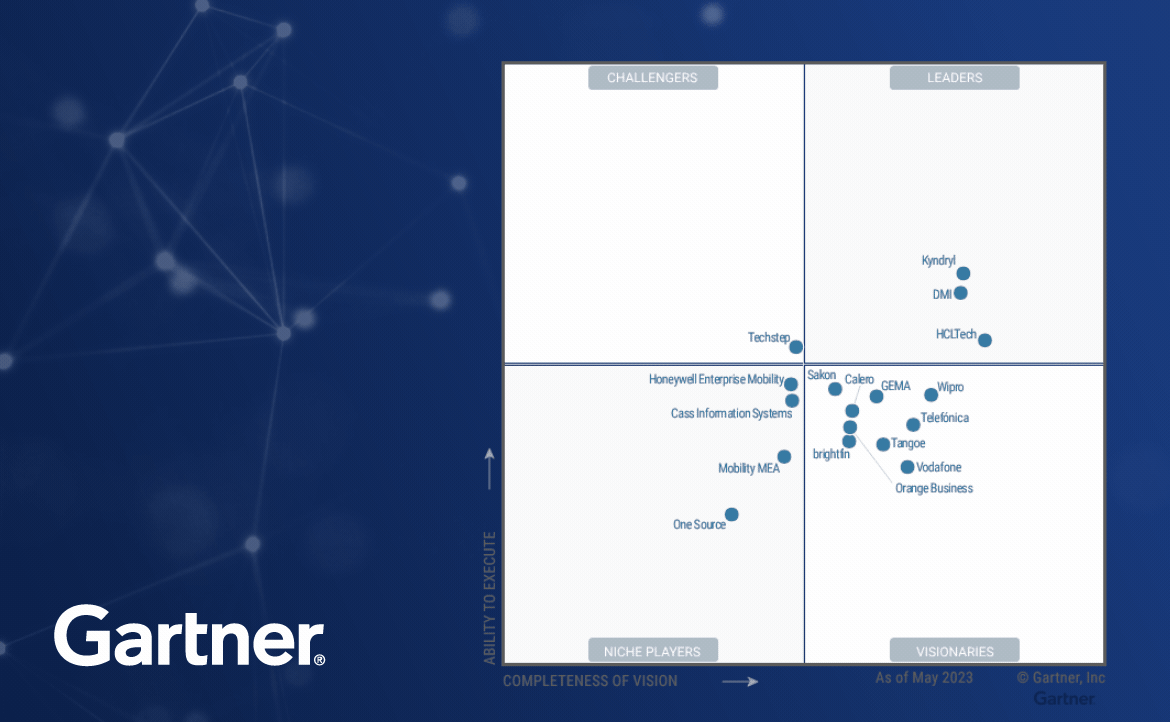The 2023 Gartner Magic Quadrant for Managed Mobility Services, Global is now available, highlighting key insights and vendor capabilities for Managed Mobility Services (MMS). This year, we saw new capabilities and new priorities for MMS. Here’s our executive summary.
Old Challenges, New Use Cases for MMS
Delivering well and doing it globally isn’t a new challenge for MMS providers. When we compare the report to the 2021 Magic Quadrant for Managed Mobility Services, Global, we see that enterprises were just as concerned about consistent service then as they are now. The market continues to mature, but demand for better experiences and increased capabilities keeps MMS providers on their toes.
The move to define Bring-You-Own-Device (BYOD) and frontline workers into unique use cases in the companion piece to the Magic Quadrant, Critical Capabilities for Managed Mobility Services, Global, from Gartner is a perfect example of the ever-changing landscape. It gives MMS providers new opportunities to develop innovative products to meet complex, evolving needs, which makes it an exciting time to be in this market.
Magic Quadrant Overview
As a reminder, the Magic Quadrant report contains the following:
- Market definition
- Gartner Magic Quadrant1
- Challengers
- Leaders
- Niche Players
- Visionaries
- MMS evaluation criteria
- Market overview
Key Takeaways from the 2023 Gartner Magic Quadrant for Managed Mobility Services, Global
1. Global Delivery and XLAs Dominate the Conversation
Throughout the 2023 Magic Quadrant for Managed Mobility Services, Global, Gartner evaluates the vendors’ ability to execute outside their home region and provide clear and standardized experience-level agreements (XLAs). We believe this will likely be the biggest call to action for MMS vendors coming out of this year’s Magic Quadrant.
From our perspective, global delivery in the context of this Magic Quadrant isn’t just about global reach, but about consistency of service. The phrase ‘patchy reach’ leads us to believe that too many global providers are missing key regions for too many customers.
Unlike service-level agreements (SLAs), which focus on service availability, XLAs establish expectations for service performance. We're of the opinion that we can expect more enterprises to enquire about XLAs in future years.
2. MMS Providers Struggle to Stand Out
Except for the top three leaders, MMS providers jostle for space around the center-right areas of the quadrant. From this, we believe that we can infer two things:
- There isn’t much differentiation between most providers. They deliver the service you expect while promising the results you anticipate.
- Most providers understand where the market is going or have a vision for changing the game, but don’t yet execute well.
This leads us to believe that strong execution appears to be a significant factor for MMS vendors looking to stand out in the market.
3. Ability to Execute is a Major Challenge
Gartner notes that organizations demand a varied and sophisticated set of services, and while MMS providers have started to meet those expectations, they’ve yet to mature fully. As such, the ability to execute effectively has become a key customer concern.
Organizations remain concerned that the delivery of these services will fail to meet requirements. This concern stems from inconsistent provider capabilities (both regionally and globally), buyer challenges to understand the total cost of ownership (TCO), and unsatisfactory and unpredictable service delivery.
– 2023 Gartner® Magic Quadrant™ for Managed Mobility Services, Global
Our interpretation of the report's findings leads us to believe that managing large and geographically dispersed mobile estates has only become more complex over the last three years. We believe that some organizations have had to draw on the strengths of multiple providers to meet their service needs.
4. Security Drives Mobile Usage
As people return to the office, one would think that the MMS market is starting to shrink. And while some mobile services have indeed declined, mobile device usage has increased. Why? Two-Factor Authentication (2FA).
2FA is a security solution that requires users to provide two or more different forms of verification before they can access their accounts or perform certain sensitive actions. 2FA adds an extra layer of security beyond just a username and password combination. Many organizations use enterprise devices as ‘authenticators’ via an app.
It's our view that this change will potentially move the focus of MMS away from providing mobility services (connectivity, Wi-Fi etc.) and towards device management, support, and cybersecurity.
5. End Users Matter
Gartner has expanded the capabilities by which it measures Magic Quadrant vendors in 2023 to include two new use cases: Bring-Your-Own-Device (BYOD) and frontline workers.
We believe that the BYOD use case highlights enterprises with both entirely or hybrid BYOD estates. Such enterprises are looking for the same end-to-end lifecycle experience as with corporate-liable devices, but for personal ones.
Frontline workers are defined by using ruggedized devices instead of common corporate devices, such as iPhones. Enterprises with frontline workers need a mix of model types, specific break/fix solutions and more end-user-focused technical support.
We feel that this change in how Gartner measures vendors in the Magic Quadrant highlights the growing remit of MMS providers, and the increased focus on enterprises giving their people the digital experiences they want. The workforce wants flexibility, so enterprises seek ways to support it.
Topics: MMS


